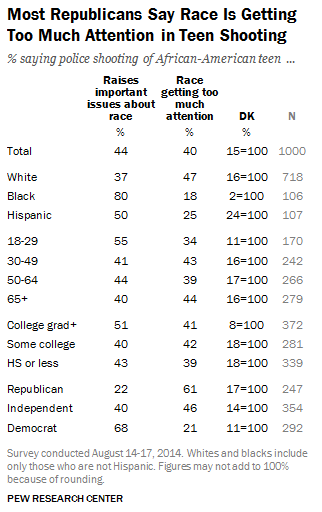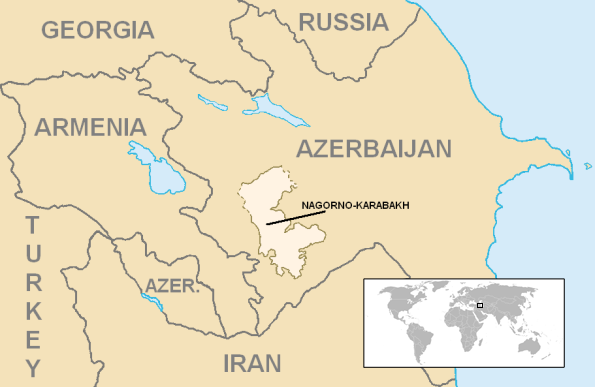Perusing the news wire services I came across an article discussing the following poll results

As I looked at the poll, I found nothing very surprising in the results. Then I looked at the question and the answer categories. I find a big problem with the answer categories. Any student who has been in my Research Methods in Political Science and paid any attention to the discussion and readings regarding survey research questions, knows that answer categories need to be mutually exclusive. In the case of this survey can I reasonably believe that the shooting raises important issues about race AND race is getting too much attention? The answer to my question is yes.
I believe the shooting raises questions about police policy and procedure in Ferguson, MO and about the racial composition of the police force of Ferguson, MO. Can a nearly all white police force truly represent/defend the local community security concerns in a community that is majority black? What opportunity for empathy with racial/ethnic histories exists within a police force that does not racially/ethnically represent the majority of the community which it is designed to serve? I have serious qualms about the ability of that police force to serve that community because of race issues, indeed important issues about race are found in this particularly troubling event.
I also believe that race is receiving too much attention in the aftermath of the event. I believe this to the extent that anyone, regardless of race should receive the same consideration under the law. If (very big IF) the police office inolved in the shooting had legitimate reason for use of deadly force (stop it, stop it, stop it all of you who are saying I am waffling here) then so be it. Do we know if the officer had reason to use deadly force--NO. We have speculation, limited pathological findings, and upset friends and relatives (on both sides) spewing vehemently in opposition to one another. We have a community up in arms about the failure of the police to be forthcoming about the event. We have a police force faced with violent behavior that the police respond to based on years of training. If you throw molotov cocktails at the police during a demonstration, they will likely use tear gas, batons, and other force to disperse you. If you throw rocks at the police, they might even taze you or fire rubber bullets into a crowd containing rock throwers. Do police respond properly? Maybe, maybe not, but that response has nothing to do with race.
So, for my two cents, the survey is designed to provoke commentary and thought. The survey question is not accompanied by quality answer set because it lacks mutual exclusivity. We get the thoughtfulness and commentary stuff, but please ask questions correctly.

As I looked at the poll, I found nothing very surprising in the results. Then I looked at the question and the answer categories. I find a big problem with the answer categories. Any student who has been in my Research Methods in Political Science and paid any attention to the discussion and readings regarding survey research questions, knows that answer categories need to be mutually exclusive. In the case of this survey can I reasonably believe that the shooting raises important issues about race AND race is getting too much attention? The answer to my question is yes.
I believe the shooting raises questions about police policy and procedure in Ferguson, MO and about the racial composition of the police force of Ferguson, MO. Can a nearly all white police force truly represent/defend the local community security concerns in a community that is majority black? What opportunity for empathy with racial/ethnic histories exists within a police force that does not racially/ethnically represent the majority of the community which it is designed to serve? I have serious qualms about the ability of that police force to serve that community because of race issues, indeed important issues about race are found in this particularly troubling event.
I also believe that race is receiving too much attention in the aftermath of the event. I believe this to the extent that anyone, regardless of race should receive the same consideration under the law. If (very big IF) the police office inolved in the shooting had legitimate reason for use of deadly force (stop it, stop it, stop it all of you who are saying I am waffling here) then so be it. Do we know if the officer had reason to use deadly force--NO. We have speculation, limited pathological findings, and upset friends and relatives (on both sides) spewing vehemently in opposition to one another. We have a community up in arms about the failure of the police to be forthcoming about the event. We have a police force faced with violent behavior that the police respond to based on years of training. If you throw molotov cocktails at the police during a demonstration, they will likely use tear gas, batons, and other force to disperse you. If you throw rocks at the police, they might even taze you or fire rubber bullets into a crowd containing rock throwers. Do police respond properly? Maybe, maybe not, but that response has nothing to do with race.
So, for my two cents, the survey is designed to provoke commentary and thought. The survey question is not accompanied by quality answer set because it lacks mutual exclusivity. We get the thoughtfulness and commentary stuff, but please ask questions correctly.

